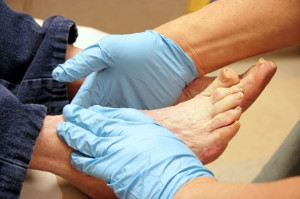
Foot neuropathy is a condition involving nerve damage in the feet, often resulting in numbness, tingling, burning sensations, or sharp pain. It can affect balance and lead to injuries due to reduced sensation. Common symptoms also include sensitivity to touch and muscle weakness. Risk factors include diabetes, alcoholism, vitamin deficiencies, infections, and certain medications. Left untreated, it can lead to serious complications, such as ulcers or infections. A podiatrist can perform a thorough evaluation, identify the underlying cause, and develop a treatment plan that may include lifestyle changes, protective footwear, or medication. If you experience unusual sensations in your feet, it is suggested that you are under the care of a podiatrist to receive specialized care and prevent further nerve damage or mobility issues.
Neuropathy
Neuropathy can be a potentially serious condition, especially if it is left undiagnosed. If you have any concerns that you may be experiencing nerve loss in your feet, consult with Richard DiBacco, DPM from Podiatry Associates of Erie, Inc.. Our doctor will assess your condition and provide you with quality foot and ankle treatment for neuropathy.
What Is Neuropathy?
Neuropathy is a condition that leads to damage to the nerves in the body. Peripheral neuropathy, or neuropathy that affects your peripheral nervous system, usually occurs in the feet. Neuropathy can be triggered by a number of different causes. Such causes include diabetes, infections, cancers, disorders, and toxic substances.
Symptoms of Neuropathy Include:
- Numbness
- Sensation loss
- Prickling and tingling sensations
- Throbbing, freezing, burning pains
- Muscle weakness
Those with diabetes are at serious risk due to being unable to feel an ulcer on their feet. Diabetics usually also suffer from poor blood circulation. This can lead to the wound not healing, infections occurring, and the limb may have to be amputated.
Treatment
To treat neuropathy in the foot, podiatrists will first diagnose the cause of the neuropathy. Figuring out the underlying cause of the neuropathy will allow the podiatrist to prescribe the best treatment, whether it be caused by diabetes, toxic substance exposure, infection, etc. If the nerve has not died, then it’s possible that sensation may be able to return to the foot.
Pain medication may be issued for pain. Electrical nerve stimulation can be used to stimulate nerves. If the neuropathy is caused from pressure on the nerves, then surgery may be necessary.
If you have any questions, please feel free to contact one of our offices located in Erie and Meadville, PA, . We offer the newest diagnostic and treatment technologies for all your foot care needs.

Diabetic foot care is important because high blood sugar levels can damage nerves and reduce blood flow to the feet. This leads to a loss of sensation, called neuropathy, which makes it hard to feel pain, temperature, or injuries. Poor circulation also slows healing, which increases the risk of infections and serious complications. Common symptoms include numbness, tingling, burning, dry or cracked skin, and slow-healing wounds. Feet may appear discolored, swollen, or develop ulcers without noticeable pain. These changes can lead to serious issues if not treated early. A podiatrist can assess circulation, nerve function, and inspect for wounds or deformities. Regular check-ups, proper nail trimming, custom footwear, and wound care are key parts of treatment. Prevention includes daily foot checks, washing and moisturizing the feet, and wearing well-fitting shoes. If you have diabetes, it is suggested that you make an appointment with a podiatrist for ongoing evaluation and treatment.
Diabetic foot care is important in preventing foot ailments such as ulcers. If you are suffering from diabetes or have any other concerns about your feet, contact Richard DiBacco, DPM from Podiatry Associates of Erie, Inc.. Our doctor can provide the care you need to keep you pain-free and on your feet.
Diabetic Foot Care
Diabetes affects millions of people every year. The condition can damage blood vessels in many parts of the body, especially the feet. Because of this, taking care of your feet is essential if you have diabetes, and having a podiatrist help monitor your foot health is highly recommended.
The Importance of Caring for Your Feet
- Routinely inspect your feet for bruises or sores.
- Wear socks that fit your feet comfortably.
- Wear comfortable shoes that provide adequate support.
Patients with diabetes should have their doctor monitor their blood levels, as blood sugar levels play such a huge role in diabetic care. Monitoring these levels on a regular basis is highly advised.
It is always best to inform your healthcare professional of any concerns you may have regarding your feet, especially for diabetic patients. Early treatment and routine foot examinations are keys to maintaining proper health, especially because severe complications can arise if proper treatment is not applied.
If you have any questions please feel free to contact one of our offices located in Erie and Meadville, PA, . We offer the newest diagnostic and treatment technologies for all your foot and ankle needs.

Gout is a form of arthritis that causes sudden, severe pain in the joints, most commonly in the big toe. It occurs when uric acid builds up in the blood, forming sharp crystals in the joints. This condition is often triggered by factors like a diet high in purines, which are found in red meat, seafood, and alcohol. Other risk factors include dehydration, obesity, or a family history of gout. Symptoms of gout include intense pain, swelling, redness, and warmth in the affected joint, often making even the light touch of a blanket unbearable. Attacks typically occur at night and can last for several days. A podiatrist can diagnose gout by evaluating your symptoms, performing a physical examination, and ordering blood tests or joint fluid analysis to check uric acid levels. Treatment options include medication to reduce inflammation, pain management, dietary recommendations, and lifestyle changes to prevent future flare-ups. If you have painful gout, it is suggested that you are under the care of a podiatrist.
Gout is a foot condition that requires certain treatment and care. If you are seeking treatment, contact Richard DiBacco, DPM from Podiatry Associates of Erie, Inc.. Our doctor will treat your foot and ankle needs.
What Is Gout?
Gout is a type of arthritis caused by a buildup of uric acid in the bloodstream. It often develops in the foot, especially the big toe area, although it can manifest in other parts of the body as well. Gout can make walking and standing very painful and is especially common in diabetics and the obese.
People typically get gout because of a poor diet. Genetic predisposition is also a factor. The children of parents who have had gout frequently have a chance of developing it themselves.
Gout can easily be identified by redness and inflammation of the big toe and the surrounding areas of the foot. Other symptoms include extreme fatigue, joint pain, and running high fevers. Sometimes corticosteroid drugs can be prescribed to treat gout, but the best way to combat this disease is to get more exercise and eat a better diet.
If you have any questions please feel free to contact one of our offices located in Erie and Meadville, PA, . We offer the newest diagnostic and treatment technologies for all your foot and ankle needs.




